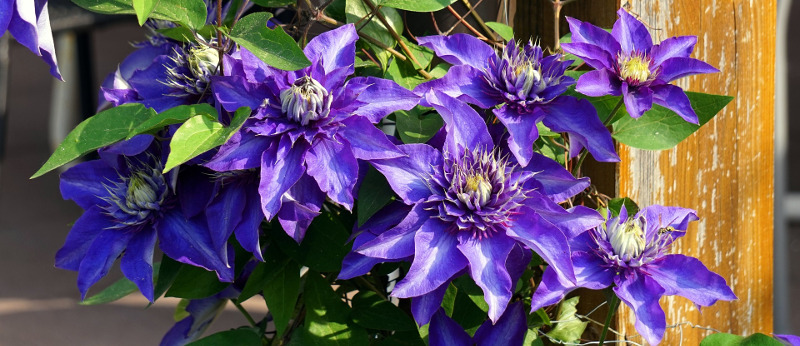Clematis are a flowering vine or shrub that can grow in USDA zones 3-9. Most often these are grown as a vine on trellises, fences or other structures that allow the vines to climb. Unfortunately, in these growing zones, deer are often prevalent and can come in contact with these beautiful plants. Deer will eat just about anything if hungry enough, so no plant is truly deer resistant. But do deer prefer clematis to other plants?
According to Rutgers University this plant is Occasionally Severely Damaged on their rating scale from “Rarely Damaged” to “Frequently Severely Damaged”.
| Rarely Damaged |
| Seldom Severely Damaged |
| Occasionally Severely Damaged |
| Frequently Severely Damaged |
This means that deer can eat your clematis if there are no other plants around that they prefer more, and if you don’t do anything to protect the plants to deter the deer from snacking on them.
Keeping Deer Away From Clematis
Clematis can be a little tricky since the plants are typically climbing up on something like a trellis. This makes the plant eye height for deer to snack on. There are several ways to keep deer away, ranging from repellent, adding a wire cage around the plant and even using human hair.
We recommend using deer repellent if possible. Here are our favorites:
For young plants, a wire cage probably makes the most sense. But that won’t be very feasible for larger clematis that are 6 feet tall. Human hair has been known to work as well. Just put some into some old panty hose and lay it next to the plants. A bar of soap is also said to work, but rain can make the soap drip onto the ground and harm plants underneath of it if you aren’t careful.

Will Clematis Come Back After Deer Eat Them?
If deer do happen to eat your clematis plants, there is still a good chance they will come back (maybe even stronger than before). Some clematis actually like to be cut down to 12 inches every year, so potentially the deer could be doing some beneficial pruning for you. So don’t give up on the plants if this happens. Simply continue to care for the plants by ensuring they get a proper amount of water and sunlight. You may even add fertilizer to help the vines or shrubs come back faster.
Sources: Rutgers New Jersey Agricultural Experiment Station ‘Landscape Plants Rated by Deer Resistance’ 2018
 |
Author Chris Link - Published 5-21-2020 |
